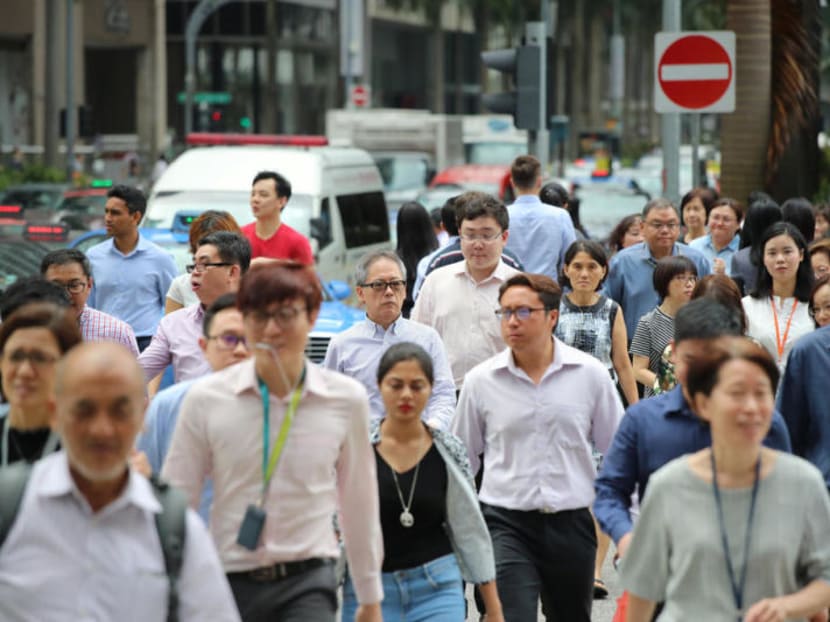Women advocates call for more caregiving support to close gender pay gap
SINGAPORE — At the end of her apprenticeship at her law firm, Jane (not her real name) asked for a pay increase of a few hundred dollars to continue her work, but this time as a legal associate.

The study found that occupational differences between men and women were the main reason behind the gender wage gap, with men concentrated in high-paying occupations, while women tend to be in more low-paying jobs.
SINGAPORE — At the end of her apprenticeship at her law firm, Jane (not her real name) asked for a pay increase of a few hundred dollars to continue her work, but this time as a legal associate.
But she got a rude shock when she broached the subject with her superior.
“My boss went to complain to everyone that I was being mercenary and I had no right to ask for more money,” she said.
Jane, who spoke on condition of anonymity as she is still working in that firm, said that while she eventually got the raise, the experience left her feeling humiliated.
This contrasted with the experience of her male colleague, who shared with her that he also asked for a pay raise, but he did not get a similar reaction from his superior.
Jane also noticed that while her male colleagues would be described as “smart” and “intelligent”, she was often told that she was “hardworking”.
Jane’s experience is one example of how women face particular challenges at work, that could contribute to differences in wages between the genders.
On Thursday (Jan 9), the Manpower Ministry released the first nationwide study on the gender wage gap in Singapore.
It found that women in Singapore are not only still earning less than men today, but the gender wage gap has increased slightly between 2002 and 2018.
Among full-time workers aged between 25 and 54, the gender wage gap rose from 16 per cent in 2002 to 16.3 per cent in 2018.
But when the differences in age, education, occupation, industry and the number of hours worked are stripped away, Singapore’s gender wage gap has shrunk — from 8.8 per cent (or a median of S$255 in dollar value) in 2002, to 6 per cent (or a median of S$342 in dollar value) in 2018.
The study also found that occupational differences between men and women were the main reason behind the gender wage gap, with men concentrated in high-paying occupations, while women tend to be in more low-paying jobs.
Ms Teo, 23, who declined to reveal her full name as she is still working in her company, notices that her client in real estate investments employs mostly men.
Her own firm, a service apartment company where pay scales are lower, is mainly dominated by women, it being more service-oriented.
Occupational differences can also be seen within the same industry.
As a consultant in a fund management firm, an industry she has been in for the past 15 years, Ms Schutz Lee said that women in her field are largely in marketing and investor relations positions, instead of being in an investment role.
“This is largely because investment professionals have to travel a lot all the time. There is more control of one’s own time in marketing and investor relations roles,” she said.
And women often do not fancy being investment professionals, despite the higher pay, because of caregiving responsibilities, pointed out the 52-year-old.
“Until the day men value family or being close to home more and women value this less, likely the gap will persist as choice of job will be self-selecting,” she added.
WHAT CAN BE DONE?
Responding to the results of the MOM study, women advocates said that while measures have been taken to close the gap, such as shared parental leave, more caregiving support needs to be provided.
Member of Parliament (MP) for MacPherson Tin Pei Ling said that fathers need to be encouraged to play a bigger role in the family.
“When parenthood is shared between father and mother, it mitigates the perception that women are a bigger liability at work than men,” she said.
Ms Tin is among a group of eight MPs who filed a parliamentary motion in 2017 for more to be done to help women juggle both family and career.
Ms Shailey Hingorani, the head of research and advocacy at the Association of Women for Action and Research (Aware), concurs, saying that caregiving responsibilities are “impediments” that prevent women from attaining job positions where they might be able to earn as much as men.
She recommends that the rights of all workers to request flexible work arrangements should be legislated and that maternity and paternity leave should be made mandatory.
A spokesperson for the Singapore Council of Women’s Organisations said that deep-rooted issues such as gender stereotypes need to be tackled, considering that the pay gap “barely moved over 16 years”.
Besides advocating for more paternity leave for fathers and support for working mothers, the spokesperson also said that more women should be encouraged to enter male-dominated fields such as in science, technology, engineering or mathematics.








